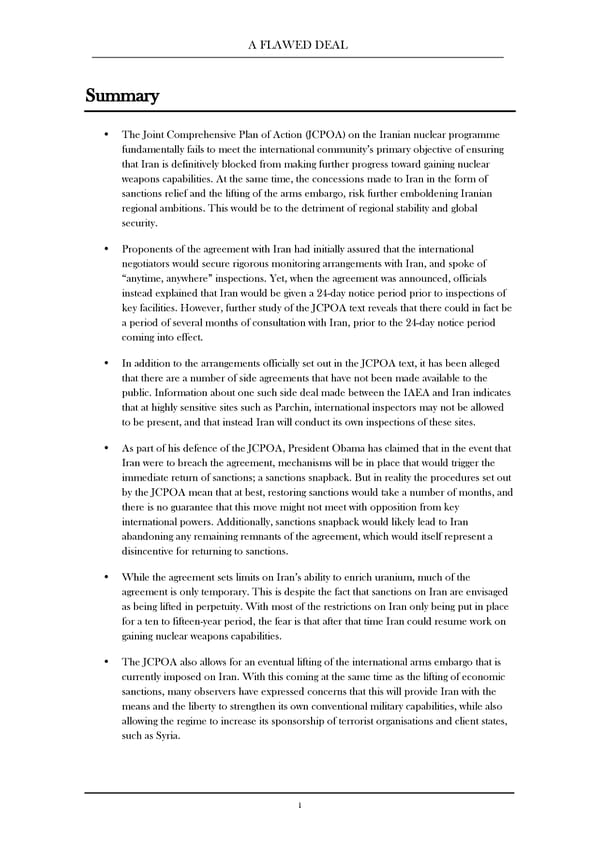! A FLAWED DEAL Summary •! The Joint Comprehensive Plan of Action (JCPOA) on the Iranian nuclear programme fundamentally fails to meet the international community’s primary objective of ensuring that Iran is definitively blocked from making further progress toward gaining nuclear weapons capabilities. At the same time, the concessions made to Iran in the form of sanctions relief and the lifting of the arms embargo, risk further emboldening Iranian regional ambitions. This would be to the detriment of regional stability and global security. •! Proponents of the agreement with Iran had initially assured that the international negotiators would secure rigorous monitoring arrangements with Iran, and spoke of “anytime, anywhere” inspections. Yet, when the agreement was announced, officials instead explained that Iran would be given a 24-day notice period prior to inspections of key facilities. However, further study of the JCPOA text reveals that there could in fact be a period of several months of consultation with Iran, prior to the 24-day notice period coming into effect. •! In addition to the arrangements officially set out in the JCPOA text, it has been alleged that there are a number of side agreements that have not been made available to the public. Information about one such side deal made between the IAEA and Iran indicates that at highly sensitive sites such as Parchin, international inspectors may not be allowed to be present, and that instead Iran will conduct its own inspections of these sites. •! As part of his defence of the JCPOA, President Obama has claimed that in the event that Iran were to breach the agreement, mechanisms will be in place that would trigger the immediate return of sanctions; a sanctions snapback. But in reality the procedures set out by the JCPOA mean that at best, restoring sanctions would take a number of months, and there is no guarantee that this move might not meet with opposition from key international powers. Additionally, sanctions snapback would likely lead to Iran abandoning any remaining remnants of the agreement, which would itself represent a disincentive for returning to sanctions. •! While the agreement sets limits on Iran’s ability to enrich uranium, much of the agreement is only temporary. This is despite the fact that sanctions on Iran are envisaged as being lifted in perpetuity. With most of the restrictions on Iran only being put in place for a ten to fifteen-year period, the fear is that after that time Iran could resume work on gaining nuclear weapons capabilities. •! The JCPOA also allows for an eventual lifting of the international arms embargo that is currently imposed on Iran. With this coming at the same time as the lifting of economic sanctions, many observers have expressed concerns that this will provide Iran with the means and the liberty to strengthen its own conventional military capabilities, while also allowing the regime to increase its sponsorship of terrorist organisations and client states, such as Syria. 1 ! !
 A Flawed Deal Page 3 Page 5
A Flawed Deal Page 3 Page 5